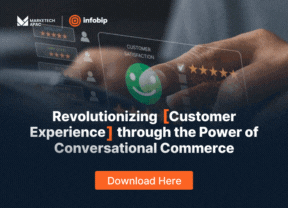Manila, Philippines – The use of artificial intelligence (AI) in marketing strategies has become a defining feature of the modern business landscape. AI is transforming the way brands interact with consumers, enabling relevant and personalized marketing campaigns, data-driven decision-making and an enhanced customer experience. And yet, as beneficial as it may seem, many are just beginning to explore the adoption of AI into their strategies. The question is, are marketers in the Southeast Asian region, especially the Philippines, ready to embrace these new technologies?
In light of this, MARKETTECH APAC invited top Filipino marketers to a roundtable discussion to share their insights on AI in marketing and how they are implementing AI in their marketing strategies. What resulted was a vivid and positive vision of how the country’s marketers can move forward as an industry that integrates AI technologies into its DNA.
Marketing executives who attended the event include:
- Blessie CruzAVP/group leader – marketing at 2GO Group inc.
- Benjamin Quiroga-RiveraManaging Director, APAC at Emma is sleeping
- Greg Anonasinternational wine and gastronomy marketing director at Emperador Distillers, Inc.
- Erik Kristofer Riolamarketing director at Firefly Electrical and Lighting Company
- AR Polinarassistant marketing director at Flash Express Philippines
- Rochelle Vandenberghedirector of marketing and digital affairs at FWD Insurance
- Brian Augustine Reyesdigital marketing manager (performance marketing manager) at Lalamove
- Kat CostasSEA e-commerce marketing manager and country marketing manager at Levi’s
- André Guévarraresponsible for marketing and brand communications at Malaysian insurance
- Pocholo Garciaresponsible for digital and e-commerce at Malaysian insurance
- Albet Roble-Boudahimmarketing director at PRIMER group of companies
- Munmun Nathmarketing director at UnionDigital Bank
Opening with a keynote speech from Konrad Feldman, co-founder and CEO of Quantcast; AI-powered technologies have enabled marketers to gain invaluable customer insights, personalize experiences, and optimize campaigns for unprecedented success. Drawing attention to AI’s ability to analyze large amounts of data in real time, Feldman also highlighted its transformative impact on customer segmentation, targeting and predictive modeling. Additionally, his presentation made a compelling case for adopting AI in marketing as an indispensable tool to unlock untapped potential, drive growth, and shape the future of customer engagement and marketing. success of the brand.
“AI is mathematics, not magic. Technology, when combined with human ingenuity and creativity, can truly be magical. AI machine learning can improve the daily advertising experiences of billions of consumers, it can help marketers get better ROI, it can help content producers generate good revenue for content production original content,” he said.
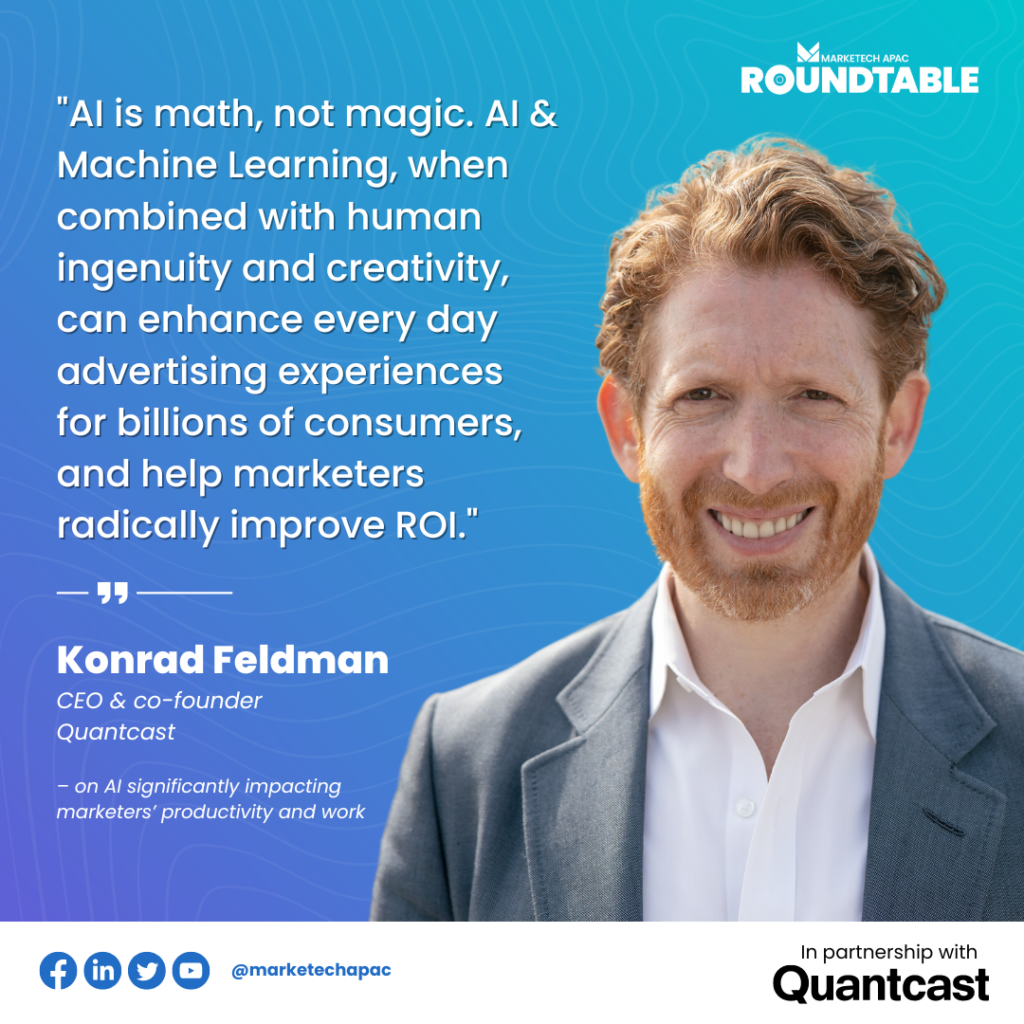
Feldman also added: “The complexity of daily tasks has increased with the market and many people are still following the same activation planning processes in the past, albeit with better tools, but more and more time is required. spent using these tools, and… lots and lots of levers and dials to constantly check and adjust, and technology has made the marketer the computer.
On the benefits and challenges of using AI for marketing
The Filipino marketing executives in attendance also shared their views on the status quo of AI in marketing and how brands could better use and benefit from it.
Pocholo Garcia of Malayan Insurance said it is using AI to strengthen its customer experience (CX) strategies.
“(AI) is primarily for CX, at least on my side, and it’s not just about getting people to convert, because that’s just the first step. We want the experience of choosing us (as an insurance provider) to be seamless for everyone, not just for customers but also for the people inside,” he said.

Meanwhile, Brian Augustine Reyes of Lalamove explained how AI is integral to improving efficiency, productivity and data-driven decision-making for brands and marketers.
“As someone who manages performance optimization on a day-to-day basis, AI can really give you more time to do the strategic thinking instead of just…identifying the right audience (and) thinking about creatives.” AI also provides the benefit of creative optimization, developing the type of communication that is effective for your audience to improve your metrics,” Reyes said.

Meanwhile, Albet Buddahim from PRIMER Group explained how the versatility of AI can benefit the e-commerce side and further reach untapped databases.
“AI can help us on the e-commerce side. We have an email database of 1.7 million, but the match on Facebook and Google is low. Maybe (AI) can help us find where the rest of that 1.7 million is going so we can incentivize them to our offers,” he said.

Finally, AR Polinar of Flash Express explained how AI is beneficial in terms of planning, saying: “We use AI for planning and forecasting. It’s really useful for us (to) make sure that our operations are really ready (based on) the data that we receive from our partners and customers.

It’s also worth noting that many marketers are also familiar with more traditional AI tools, including the generative AI tool ChatGPT.
Benjamin Quiroga-Rivera of Emma Sleep says AI tools like ChatGPT are easy to understand and accessible to everyone, including marketers.
“What we saw particularly with this consumer product, ChatGPT, is how accessible and easy it is to visualize and imagine creations, which we found quite fun to play with,” he said. he declares.
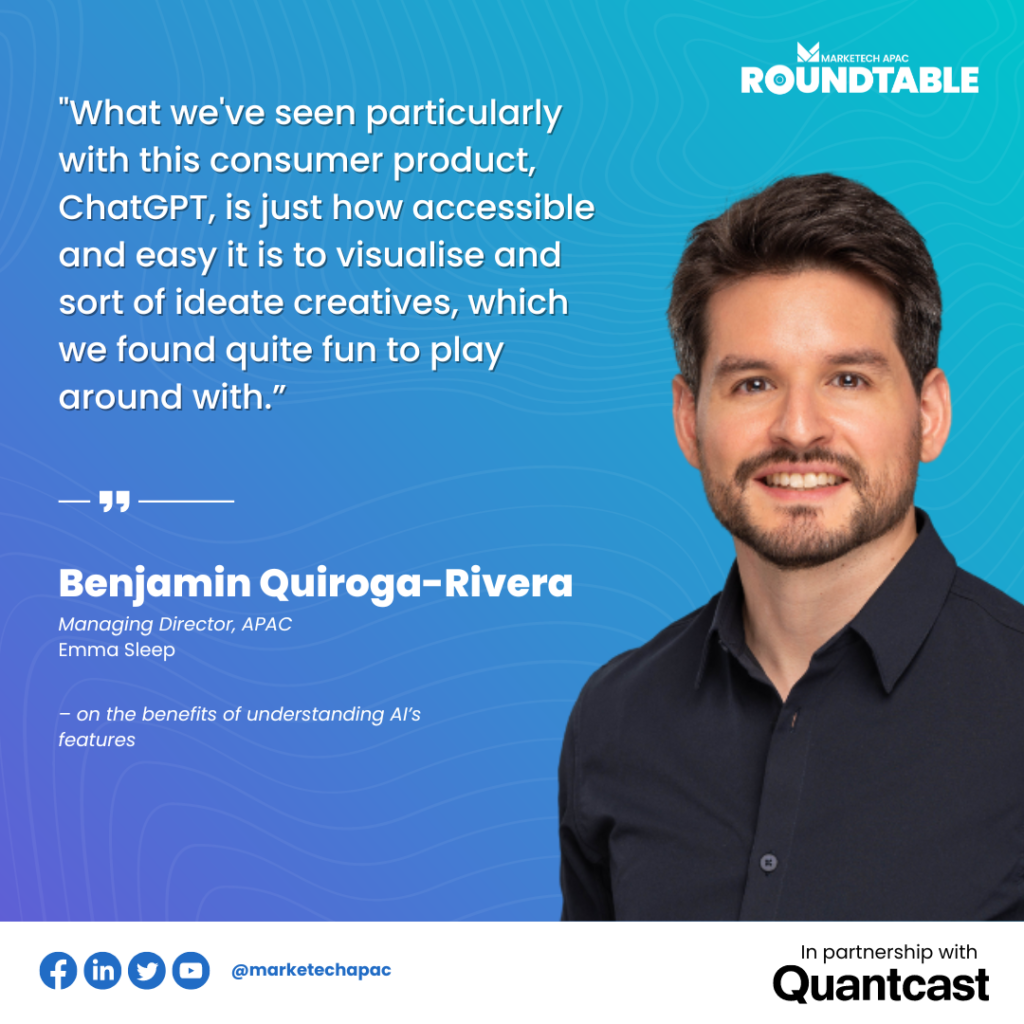
Despite the benefits that AI has brought to marketers, concerns remain about whether there are people actually capable of using such technology.
This is what Kat Costas of Levi’s said: “For us, it’s (about) automation and personalization… (AI) helps us with media, in terms of identifying the right ones segments (and) good assets which will be served through each of the segments. The big challenge for us is whether we have the people capable of using the technology.
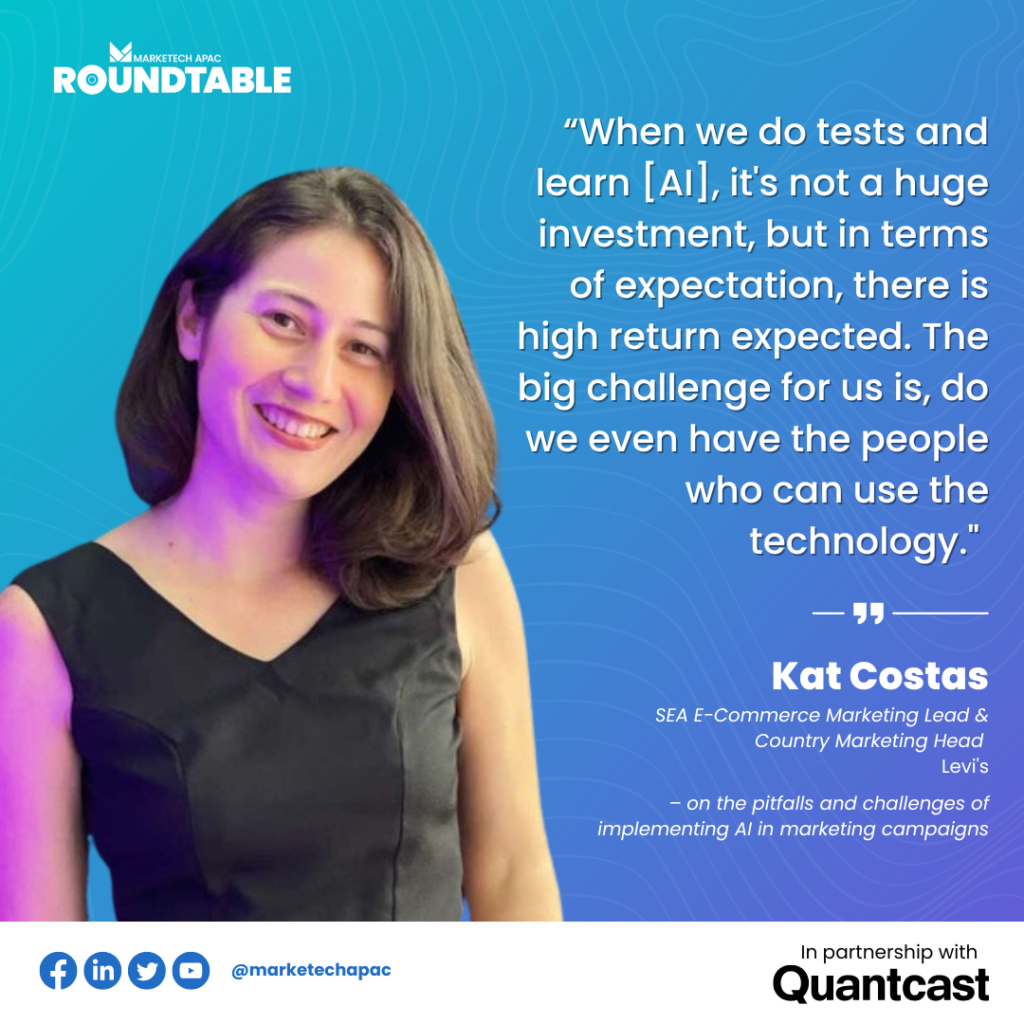
The negative implications of AI
Despite all the benefits that AI brings to the marketing scene, industry leaders still remain uncertain about the use of these AI tools.
AR Polinar of Flash Express noted that the downside of using AI was the loss of qualitative data when optimizing AI tools.
“One of the downsides would be focusing more on quantity rather than quality because of AI. We may not verify the data we receive or take action immediately. The challenge is to always verify the (data or) actions of our consumers on the ground,” he said.
For Greg Anonas of Emperador Distiller, AI still has limited capabilities to explore unknown marketing territories.
“When it comes to AI, we think it’s a boon for everyone, but it has some things it can’t handle. For example, strategic thinking and entrepreneurial thinking. What worries us is that as we advance in AI, we are tackling things that people have never done before,” he said.
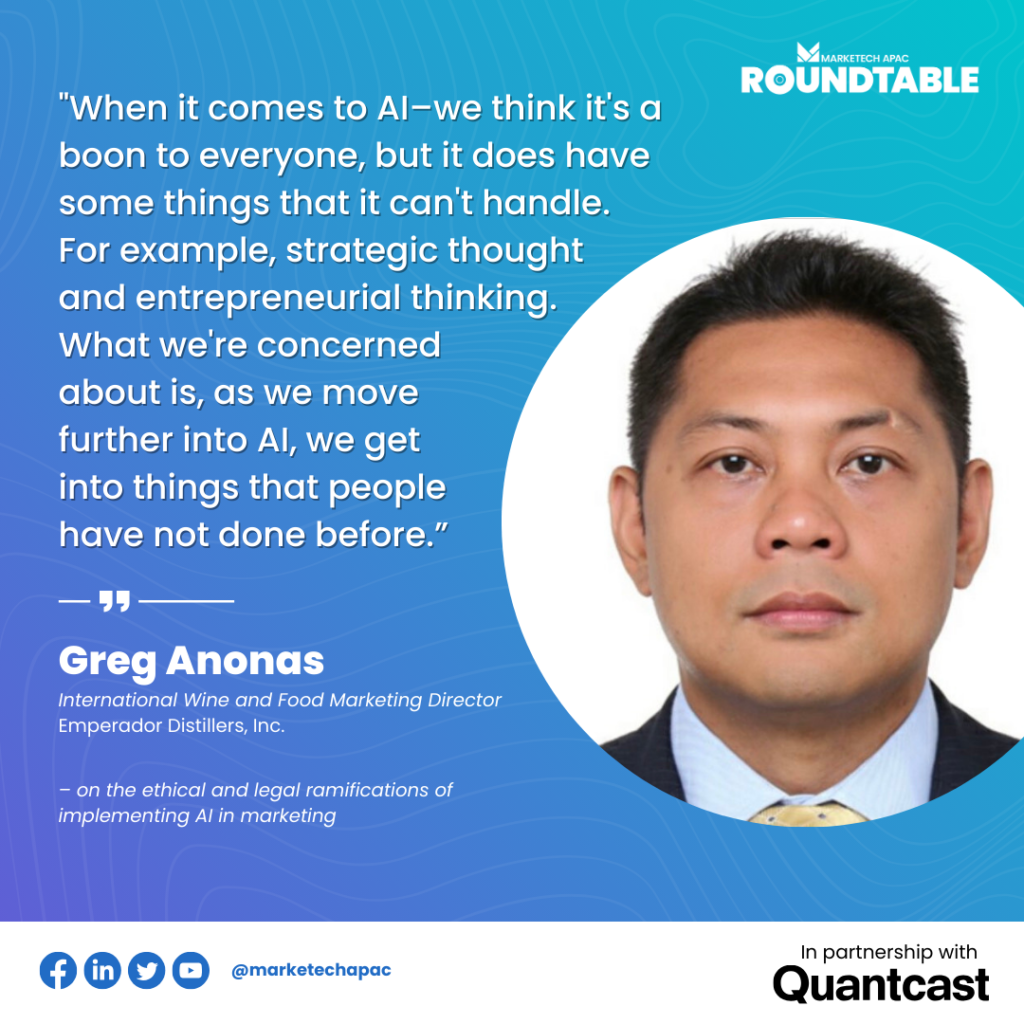
Meanwhile, Firefly Electric’s Erik Riola said that while there are some negative perspectives on AI technologies, marketers are still open to exploring such tools.
“People tend to focus on the negatives rather than the benefits that (AI) could gain… It’s in the understanding, which I feel as a marketer, that we could better use and use these technologies. But I say this is a conscious level of optimism because it’s still very fresh, at least from a consumer perspective,” Riola said.
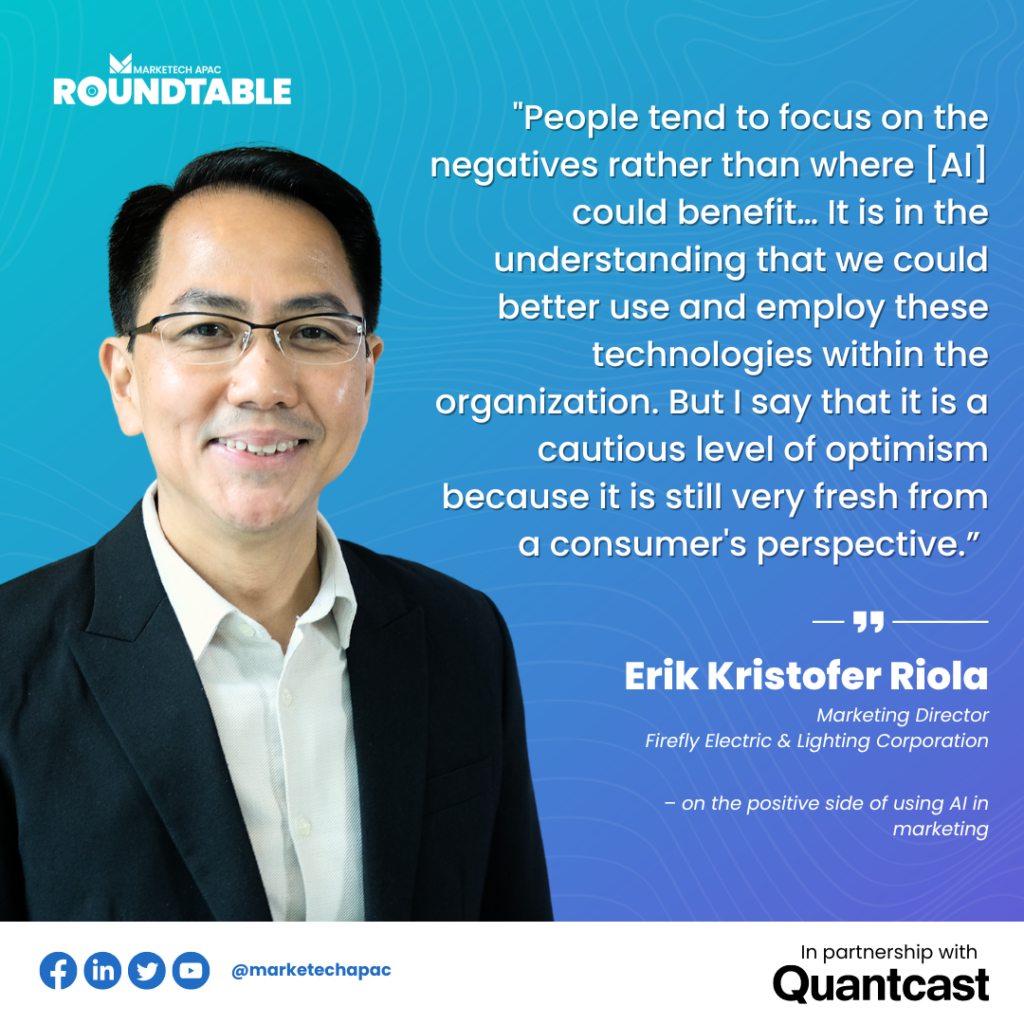
He added: “All of a sudden a lot of people are talking about ChatGPT, and as a marketer you don’t want to be a dinosaur in your industry… you want to learn this technology. And that’s what we’re trying to use today.
Industry leaders have recognized the transformative power of AI to enable personalized experiences, data-driven decision-making and improve customer engagement. And expressed the undeniable benefits and potentials of implementing AI in various marketing strategies.
They also highlighted the positive impacts of AI in terms of efficiency, productivity and creative optimization, as it becomes more accessible to marketers. While acknowledging these, they also raised concerns about constraints such as investment or time, loss of qualitative data and entry into unmarked territory.
As AI continues to evolve, the future of marketing offers exciting prospects and could redefine the way consumers interact with products and services, taking engagement to unprecedented heights.
However, it is important to note that while AI offers immense potential, human creativity, emotional intelligence and ethical considerations still play a crucial role in designing campaigns that truly connect with audiences on a meaningful level. In this journey, collaboration will be key – between marketers and AI systems, between industry peers and with consumers to ensure the right balance is struck.



